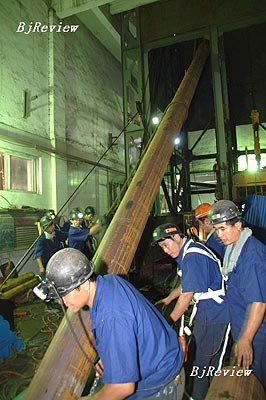
Rescue work continues at a flooded mine in China's eastern Shandong Province where 172 people were trapped on August 17, but hopes of bringing anyone out alive are dimming fast.
Speaking to CCTV, China's national television broadcaster on August 22, Zhang Baoyi, a member of the rescue team, said pumping water out of the mineshafts would be a long process. An estimated 12.6 million cubic meters of water and 200,000 cubic meters of mud was washed into them.
Experts have attributed the disaster to unusually heavy rainfall that caused flood water to sweep through a 65-meter wide breach in the Wenhe River levee, and into the Huayuan and Minggong mines, about 150 km south of Shandong's provincial capital Jinan, on the afternoon of August 17.
Xintai, the city where the two ill-fated mines are located, reported 730 mm of precipitation from January 1 to August 17, according to local meteorological data.
"That's about the same volume of rainfall we normally have for the whole year," said Yin Changwen, a water conservation expert with the rescue team.
The city's average annual precipitation is 745 mm, he said. Between 2:00 a.m. and 3:00 p.m. on August 17, the Dongzhou Reservoir on the upper reaches of the Weishui River, a tributary of the swollen Wenhe River, received 161 mm of rainfall, the largest volume of rain in the region in 70 years.
"The torrent from upstream poured down into the Wenhe River at 1,800 cubic meters per second, and instantly tore a breach in the levee," he added.
Before the breach was blocked early on August 19 to pave way for the rescue operation, an estimated 12.6 million cubic meters of water had poured down the two adjacent pits.
As rescue work continued on August 22 the water level in the Huayuan Mine where the 172 miners are trapped had fallen by 26.01 meters to 66.59 meters, meaning there was still a 96-meter depth of water to the nearest working site estimated to have trapped miners.
An extra pump was put into operation at around midday, bringing the drainage capacity to more than 1,500 cubic meters per hour, doubling the previous capacity.
Rescue work was hampered when another pump with a drainage capacity of 600 cubic meters per hour, stopped working due to a broken pipe, and then resumed pumping at around 8:00 p.m., according to the rescue team.
In addition, two of four drilling sets being used in the operation, that were brought in from Shengli Oilfield on August 20, began to drill wells to divert water from the flooded shafts. They had dug 119 meters deep, almost one third of the 385-meter target.
Around 120 cubic meters of water can be pulled out via each well per hour, the rescue team said. The rescue headquarters are waiting for more powerful drilling machines to speed up the operation.
Another water pump with a capacity of 600 cubic meters per hour was put into operation on the night of August 22, rescuers said.
Eighty-five relatives of the trapped miners have fallen sick because of grief and are receiving treatment in hospital, according to Huang Longhua, an official with the rescue headquarters tasked with consoling the families of the victims.
The government has dispatched 134 medical workers to take care of the sick relatives, Huang said, adding that all the sick are in stable condition.
Managers at the Huayuan Mine have also sent 545 employees to console the families of the trapped miners.
Despite speculation that the mine accident was a natural disaster a clear decision on the cause has yet to be reached.
"The State Council, or the Chinese cabinet, is yet to set up an investigation team," Huang Yi, a spokesman for the State Administration of Work Safety, told Xinhua news agency. "And we have not been able to determine the cause of accident thus far."
He added, "The top priority at the moment is to speed up rescue work and do whatever we can to search for the victims."
The investigation's decision could prove vital to relatives of the miners. China has no compensation system for victims of natural disasters. However, the minimum compensation for people killed in mine mishaps is 200,000 yuan, unless it is the result of a natural disaster. On August 22, every family of the trapped miners was given 2,000 yuan as consolation.
(Additional reporting from Xinhua) | 